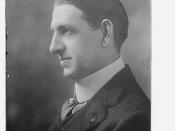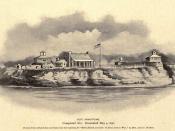I am Every Woman
Alice Walker was born in a small town in Georgia in 1944 to a poor family. Around the tender age of eight, Walker was shot in one of her eyes by her brother with a BB gun. Walker's family was unable to afford proper medical treatment for her leaving her blind in that eye (Alice). Walker allowed the pain that she felt as a child and the discrimination she experienced in her adulthood to evolve her into the brilliant writer that she is today. In the short story, "Everyday Use", the qualities of Walker's self perception, success and story telling abilities are evident in her three main characters, Mrs. Johnson, Dee and Maggie. Walker's claim can be interrupted in many ways such as talking about family, then it could be about heritage, quilts or it could be about self interpretation. Walker's use of self interpretation is very prevalent to the reader in the way she writes about her characters showing her past and present, revealing the claim that you can run, but you can not hide from who you really are.
Walker used pathos to lure in her readers by appealing to the reader's emotions. In order to gain sympathy she describes Maggie as the ugly one, "â¦stand hopelessly in corners, homely and ashamed of the burn scars down her arms and legsâ¦" (Walker 449), and "[l]ike good looks and money, quickness passed her by" (451). Maggie has very low self esteem and is self conscience about her appearance; she walks with her "...chin on chest, eyes on ground, and feet in shuffleâ¦" (450). This reference is significant for the reader to see how Walker's saw herself when she lost her eye at a young age causing her feel ugly and disfigured, which led to her having low self esteem about herself. She could have easily said that Maggie was shy, funny looking or slow, but she felt it was important to have Maggie to possess the burn scars down her arms and legs in order to grab the audience (449).
The message in the story is implied. It is implied because of the various interpretations that the readers could obtain from reading. The intended audience is anyone that is assigned to read this story, anyone that is a fan of Walker or anyone that needs clarity about family conflict.
One of the major transitions in the story is the character Dee. Dee reveals how Walker evolved into a beautiful, educated, stylish yet selfish through the years against all odds. By way of education, Walker was able to become intellectual, more comfortable in her skin to be able to express herself verbally and literally. Along with that came the confidence that give her the reflection of beauty on the inside and outside. She began to accept herself more as an adult because of the new experience that college life had to offer her.
Dee is described as "⦠is lighter than Maggie, with nicer hair and a fuller figure" (Walker 450). The significance of Dee being lighter is that in the society, lighter is considered to be better than dark. Even within the African American community, light skin is usually associated with beauty and good hair. Dee desperately wanted to forget where she came from that she changed her name from Dee to Wangero Leewanika Kemanjo to embrace her African heritage. In real life, the change represented that Walker wanted to forget where she came from. Walker was raised in the south during the Jim Crow Laws era in Georgia when times were especially hard for African Americans. It can be safely implied that Walker was mistreated and discriminated against. She experienced racism and wanted to be able to be in a society that would accept her as a person instead of a color. In 1965 Walker married a white Jewish lawyer causing constant harassment and threats by the Ku Klux Klan. (Wikipedia). This alone is a valid reason for Walker wanting to turn her back on her bitter past and learn more about her heritage that white people has hated so for many generations.
The mother, narrator and Mrs. Johnson, describes herself as "â¦a large, big-boned woman with rough, man-working hands." She also states that she can "â¦can kill and clean a hog as mercilessly as a man" (450). She is uneducated; "I never had an education myself" (451). This character allows Walker to shed light on how she sees herself in both Dee and Maggie. Walker examined her feelings for the two and chose Maggie in the end. Maggie represents the heart of Walker that will never die.
Walker did an excellent job of expressing her claim of people needing to soul search themselves in order to really know they are and what they are made of. Walker challenges each of us to examine ourselves for the truth. Only when a person realizes their good and bad, then they can change them. Changing is not easy nor is it a bad thing, but it is surely inevitable. Embrace change as a positive thing and a learning experience as well as a healing tool. No matter where they go, what they do, they are still themselves. No one can run from themselves.
Work Cited
"Alice Walker." Wikipedia, The Free Encyclopedia. 4 Nov 2007. 06:04 UTC. Wikimedia Foundation,Inc. 4 Nov 2007. http://en.wikipedia.org/w/index.php?title=Alice_Walker&oldid=169105612.
Walker, Alice. "Everyday Use for your grandmama." Reading Literature and Writing Argument. Custom Edition for OCCC. Ed. Missy James and Alan P. Merickel. Upper Saddle River: Prentice Hall, 2008: 449-55.





